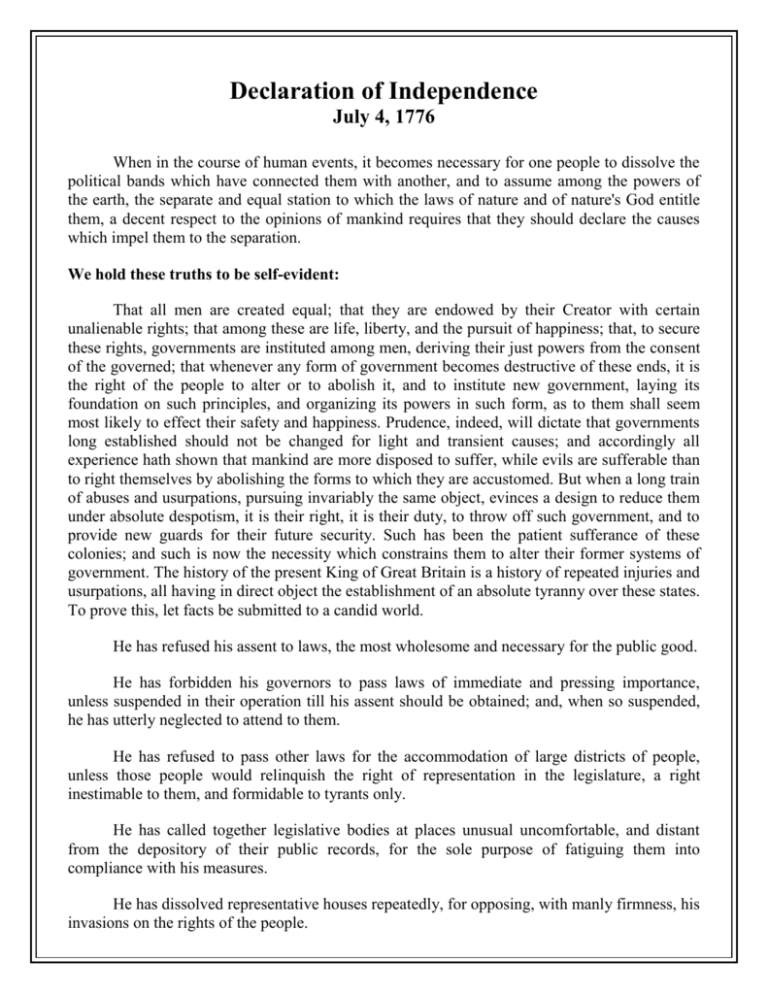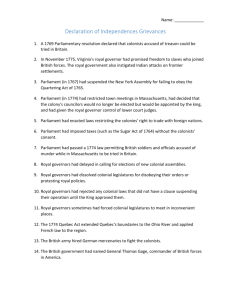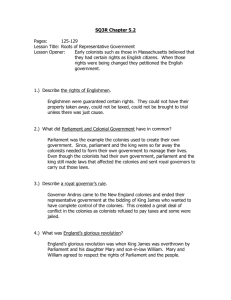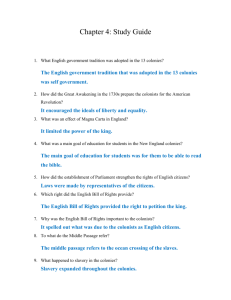Dec. of Indep. and Grievances (Was the Rev Justified
advertisement

Declaration of Independence July 4, 1776 When in the course of human events, it becomes necessary for one people to dissolve the political bands which have connected them with another, and to assume among the powers of the earth, the separate and equal station to which the laws of nature and of nature's God entitle them, a decent respect to the opinions of mankind requires that they should declare the causes which impel them to the separation. We hold these truths to be self-evident: That all men are created equal; that they are endowed by their Creator with certain unalienable rights; that among these are life, liberty, and the pursuit of happiness; that, to secure these rights, governments are instituted among men, deriving their just powers from the consent of the governed; that whenever any form of government becomes destructive of these ends, it is the right of the people to alter or to abolish it, and to institute new government, laying its foundation on such principles, and organizing its powers in such form, as to them shall seem most likely to effect their safety and happiness. Prudence, indeed, will dictate that governments long established should not be changed for light and transient causes; and accordingly all experience hath shown that mankind are more disposed to suffer, while evils are sufferable than to right themselves by abolishing the forms to which they are accustomed. But when a long train of abuses and usurpations, pursuing invariably the same object, evinces a design to reduce them under absolute despotism, it is their right, it is their duty, to throw off such government, and to provide new guards for their future security. Such has been the patient sufferance of these colonies; and such is now the necessity which constrains them to alter their former systems of government. The history of the present King of Great Britain is a history of repeated injuries and usurpations, all having in direct object the establishment of an absolute tyranny over these states. To prove this, let facts be submitted to a candid world. He has refused his assent to laws, the most wholesome and necessary for the public good. He has forbidden his governors to pass laws of immediate and pressing importance, unless suspended in their operation till his assent should be obtained; and, when so suspended, he has utterly neglected to attend to them. He has refused to pass other laws for the accommodation of large districts of people, unless those people would relinquish the right of representation in the legislature, a right inestimable to them, and formidable to tyrants only. He has called together legislative bodies at places unusual uncomfortable, and distant from the depository of their public records, for the sole purpose of fatiguing them into compliance with his measures. He has dissolved representative houses repeatedly, for opposing, with manly firmness, his invasions on the rights of the people. He has refused for a long time, after such dissolutions, to cause others to be elected; whereby the legislative powers, incapable of annihilation, have returned to the people at large for their exercise; the state remaining, in the mean time, exposed to all the dangers of invasions from without and convulsions within. He has endeavored to prevent the population of these states; for that purpose obstructing the laws for naturalization of foreigners; refusing to pass others to encourage their migration hither, and raising the conditions of new appropriations of lands. He has obstructed the administration of justice, by refusing his assent to laws for establishing judiciary powers. He has made judges dependent on his will alone, for the tenure of their offices, and the amount and payment of their salaries. He has erected a multitude of new offices, and sent hither swarms of officers to harass our people and eat out their substance. He has kept among us, in times of peace, standing armies, without the consent of our legislatures. He has affected to render the military independent of, and superior to, the civil power. He has combined with others to subject us to a jurisdiction foreign to our Constitution and unacknowledged by our laws, giving his assent to their acts of pretended legislation: For quartering large bodies of armed troops among us; For protecting them, by a mock trial, from punishment for any murders which they should commit on the inhabitants of these states; For cutting off our trade with all parts of the world; For imposing taxes on us without our consent; For depriving us, in many cases, of the benefits of trial by jury; For transporting us beyond seas, to be tried for pretended offenses; For abolishing the free system of English laws in a neighboring province, establishing therein an arbitrary government, and enlarging its boundaries, so as to render it at once an example and fit instrument for introducing the same absolute rule into these colonies; For taking away our charters, abolishing our most valuable laws, and altering fundamentally the forms of our governments; For suspending our own legislatures, and declaring themselves invested with power to legislate for us in all cases whatsoever. He has abdicated government here, by declaring us out of his protection and waging war against us. He has plundered our seas, ravaged our coasts, burned our towns, and destroyed the lives of our people. He is at this time transporting large armies of foreign mercenaries to complete the works of death, desolation, and tyranny already begun with circumstances of cruelty and perfidy scarcely paralleled in the most barbarous ages, and totally unworthy the head of a civilized nation. He has constrained our fellow-citizens, taken captive on the high seas, to bear arms against their country, to become the executioners of their friends and brethren, or to fall themselves by their hands. He has excited domestic insurrection among us, and has endeavored to bring on the inhabitants of our frontiers the merciless Indian savages, whose known rule of warfare is an undistinguished destruction of all ages, sexes, and conditions. In every stage of these oppressions we have petitioned for redress in the most humble terms; our repeated petitions have been answered only by repeated injury. A prince, whose character is thus marked by every act which may define a tyrant, is unfit to be the ruler of a free people. Nor have we been wanting in our attentions to our British brethren. We have warned them, from time to time, of attempts by their legislature to extend an unwarrantable jurisdiction over us. We have reminded them of the circumstances of our emigration and settlement here. We have appealed to their native justice and magnanimity; and we have conjured them, by the ties of our common kindred, to disavow these usurpations which would inevitably interrupt our connections and correspondence. They too, have been deaf to the voice of justice and of consanguinity. We must, therefore, acquiesce in the necessity which denounces our separation, and hold them as we hold the rest of mankind, enemies in war, in peace friends. We, therefore, the representatives of the United States of America, in General Congress assembled, appealing to the Supreme Judge of the world for the rectitude of our intentions, do, in the name and by the authority of the good people of these colonies solemnly publish and declare, That these United Colonies are, and of right ought to be, FREE AND INDEPENDENT STATES; that they are absolved from all allegiance to the British crown and that all political connection between them and the state of Great Britain is, and ought to be, totally dissolved; and that, as free and independent states, they have full power to levy war, conclude peace, contract alliances, establish commerce, and do all other acts and things which independent states may of right do. And for the support of this declaration, with a firm reliance on the protection of Divine Providence, we mutually pledge to each other our lives, our fortunes, and our sacred honor. Was the Revolution Justified? 1760-1780 Did the colonists have grievances against the British government substantial enough to justify revolution? In the Declaration of Independence, the American patriots listed "a history of injuries and usurpations" designed to establish "an absolute Tyranny over these states." What specific abuses did the delegates cite? 1. "He has refused his Assent to Laws necessary for the public good." The King had rejected laws passed by colonial assemblies. 2. "He has forbidden his Governors to pass Laws of pressing importance." Royal governors had rejected any colonial laws that did not have a clause suspending their operation until the King approved them. 3. "He has refused to pass Laws unless people would relinquish the right of Representation." The Crown had failed to redraw the boundaries of legislative districts to ensure that newly settled areas were fairly represented in colonial assemblies. 4. "He has called together legislative bodies at places distant from the depository of their public records." Royal governors sometimes had forced colonial legislatures to meet in inconvenient places. 5. "He has dissolved Representative Houses repeatedly." Royal governors had dissolved colonial legislatures for disobeying their orders or protesting royal policies. 6. "He has refused for a long time, after such dissolutions, to cause others to be elected." Royal governors had delayed in calling for elections of new colonial assemblies. 7. "He has endeavored to prevent the population of these States." The King had impeded the development of the colonies by prohibiting the naturalization of foreigners (in 1773) and raising the purchase price of western lands (in 1774). 8. "He has obstructed the Administration of justice." The King had rejected a North Carolina law setting up a court system. 9. "He has made judges dependent on his Will alone.” The Crown had insisted that judges serve at the King's pleasure and that they should be paid by him. 10. "He has erected a multitude of New Offices to harass our people." The royal government had appointed tax commissioners and other officials. 11. "He has kept among us, in times of peace, Standing Armies." The Crown had kept an army in the colonies after the Seven Years' War without the consent of the colonial legislatures. 12. "He has affected to render the Military independent of Civil power." The British government had named General Thomas Gage, commander of British forces in America. 13. "He has subject[ed] us to a jurisdiction foreign to our constitution." The royal government had claimed the power (in the Declaratory Act of 1766) to make all laws for the colonies. 14. "For quartering armed troops among us." The Crown had required the colonies to house British troops stationed in America. 15. "For protecting them from punishment for Murders." Parliament had passed a 1774 law permitting British soldiers and officials accused of murder while in Massachusetts to be tried in Britain. 16. "For cutting off our Trade." Parliament had enacted laws restricting the colonies' right to trade with foreign nations. 17. "For imposing Taxes on us without our Consent." Parliament had imposed taxes (such as the Stamp Act of 1765) without the colonists' consent. 18. "For depriving us of the benefits of Trial by Jury." The royal government had deprived colonists of a right to a jury trial in cases dealing with smuggling and other violations of trade laws. 19. "For transporting us beyond Seas to be tried." A 1769 Parliamentary resolution declared that colonists accused of treason could be tried in Britain. 20. "For abolishing the free System of English Laws in a neighboring Province." The 1774 Quebec Act extended Quebec's boundaries to the Ohio River and applied French law to the region. 21. "For taking away our Charters." Parliament (in 1774) had restricted town meetings in Massachusetts, had decided that the colony's councilors would no longer be elected but would be appointed by the king, and had given the royal governor control of lower court judges. 22. "For suspending our Legislatures." Parliament (in 1767) had suspended the New York Assembly for failing to obey the Quartering Act of 1765. 23. "Waging War against us" The Crown had authorized General Thomas Gage to use force to make the colonists obey the laws of Parliament. 24. "He has plundered our seas...burnt our towns." The British government had seized American ships that violated restrictions on foreign trade and had bombarded Falmouth (now Portland), Me.; Bristol, R.I.; and Norfolk, Va. 25. "He is...transporting large Armies of foreign Mercenaries.” The British army hired German mercenaries to fight the colonists. 26. "He has constrained our fellow Citizens to bear Arms against their Country." The Crown had forced American sailors (under the Restraining Act of 1775) to serve in the British navy. 27. "He has excited domestic insurrections amongst us." In November 1775, Virginia's royal governor had promised freedom to slaves who joined British forces. The royal government also instigated Indian attacks on frontier settlements. In the eyes of the American patriots, what rights or liberties had the British Parliament violated? Parliament seemed intent on slowing the colonies' growth and protecting British economic interests at the colonists' expense. Royal officials had restricted westward expansion, levied taxes without the colonists' consent, and stationed a standing army in the colonies in peacetime. In addition, the Crown had expanded the imperial bureaucracy, made the West a preserve for French Catholics and Indians, and infringed on traditional English liberties, including the right to trial by jury, freedom from arbitrary arrest and trial, freedom of speech and conscience, and the right to freely trade and travel. Parliament had also restricted meetings of legislative assemblies, vetoed laws passed by assemblies, billeted soldiers in private homes, and made royal officials independent of colonial legislatures. Declaration of Independence Vocabulary: Acquiesce – to consent or comply passively or without protest Arbitrary – having unlimited power; uncontrolled or unrestricted by law; Consanguinity – close connection or relationship with; from the same kinship as another person—connection through blood Despotism – rule of a despot—the exercise of absolute authority, autocratic government Disavow – to disclaim knowledge of, responsibility for, or association with Evinces – to show clearly; to make evident; prove Insurrection – act of rising in revolt, rebellion, or resistance against an established govt Magnanimity – generosity Perfidy – deliberate breach of faith or trust; faithlessness; disloyalty Prudence – regard for one’s own interests; discretion Rectitude – moral uprightness; righteousness Redress – to make right; remedy; to make amends to Transient – not lasting, enduring, or permanent; lasting only a short time Unalienable (inalienable) – not able to be transferred to another; incapable of being surrendered Unwarrantable – without justification Usurpation – illegal seizure and occupation; wrongful or illegal infringement or seizure








